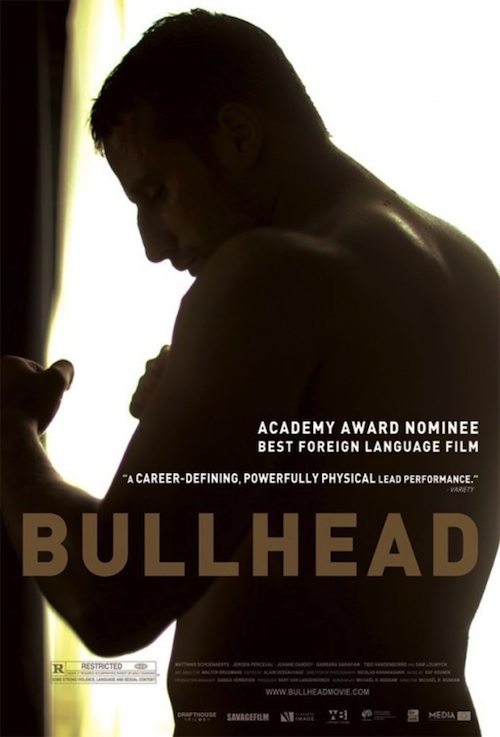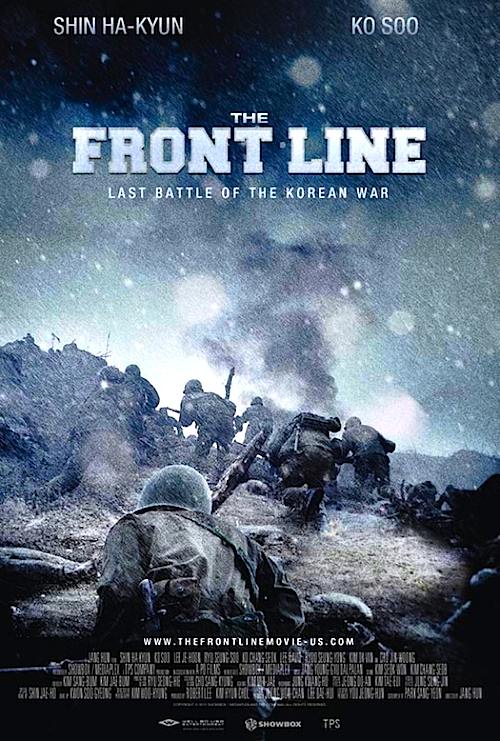By Joe Bendel. It is hard to believe Belgium has any comparative advantage in the beef packing industry. Regardless, watching the Flemish bovine mafia ply their cattle with hormones will not inspire global consumer confidence. One angry breeder takes massive doses himself. Regrettably, he has a very good reason for such treatments, which viewers see in painful detail early in Michaël Roskam’s Bullhead, Belgium’s surprise best foreign language Oscar nominee, opening this Friday in New York.
Jacky Vanmarsenille resembles the bulls he sullenly tends (hence the title). He looks all man, but an incident in his childhood left him somewhat less so. To compensate, he has built up his body, but the constant cocktails of testosterone and steroids have exacerbated his anger issues. Poorly socialized, Vanmarsenille’s resentment metastasizes over time. When figures from his past suddenly reappear, his behavior becomes more erratic. Unfortunately, this leads his family to discount his warnings not to get involved with Marc De Kuyper, the duplicitous Godfather of growth hormones.
 Bullhead is quite an unlikely Oscar contender. Indeed, Belgium raised many eyebrows when it submitted Roskam’s film instead of the Dardenne Brothers’ French language The Kid with a Bike, but they seem to have known what they were doing. This is a tough picture that is difficult to pigeon hole. As a character study, it broods in a class by itself. Indeed, there may be no protagonist that is as equally sympathetic and scary as Jacky Vanmarsenille. Yet, its gangster movie elements are not mere window dressing for the naturalistic morality play. Roksam’s screenplay also reflects Belgium’s Flemish-French divide in ways not especially flattering to the latter, adding a further layer of context for those who can pick up on it.
Bullhead is quite an unlikely Oscar contender. Indeed, Belgium raised many eyebrows when it submitted Roskam’s film instead of the Dardenne Brothers’ French language The Kid with a Bike, but they seem to have known what they were doing. This is a tough picture that is difficult to pigeon hole. As a character study, it broods in a class by itself. Indeed, there may be no protagonist that is as equally sympathetic and scary as Jacky Vanmarsenille. Yet, its gangster movie elements are not mere window dressing for the naturalistic morality play. Roksam’s screenplay also reflects Belgium’s Flemish-French divide in ways not especially flattering to the latter, adding a further layer of context for those who can pick up on it.
Without question though, the key to the film is Matthias Schoenaerts, who really is quite extraordinary as Vanmarsenille. His physical transformation into the hulking protagonist has been compared to De Niro’s bulking up for Raging Bull, but that is really the least of it. With little dialogue, he conveys volumes, keeping the audience fully invested in his character, even when he commits terrible deeds. This is ferociously intense work. Jeroen Percival provides an effective counterpoint as the nervous Diederik Maes, Vanmarsenille’s oily childhood friend and polar opposite physically, sexually, and temperamentally.
Bullhead’s deliberate pacing and wince-inducing plot developments might discomfort less adventurous viewers, but under Roksam’s sure hand they become high tragedy. In truth, few films so directly address what it means to be both a man and a monster. On Oscar night, it will be the longest of long shots, but Bullhead can go toe to toe with any of its fellow nominees, including Asghar Farhadi’s A Separation, considered the frontrunner amid a very strong foreign language field this year. Highly recommended, Bullhead opens tomorrow (2/17) in New York at the Angelika Film Center and AMC Empire and next Friday (2/24) in San Francisco at the Bridge Theatre.
Posted on February 16th, 2012 at 10:33am.

